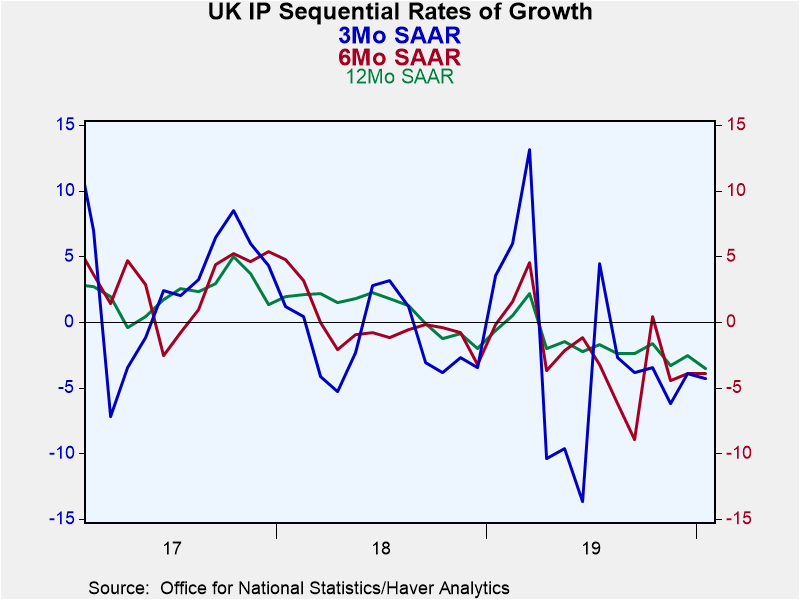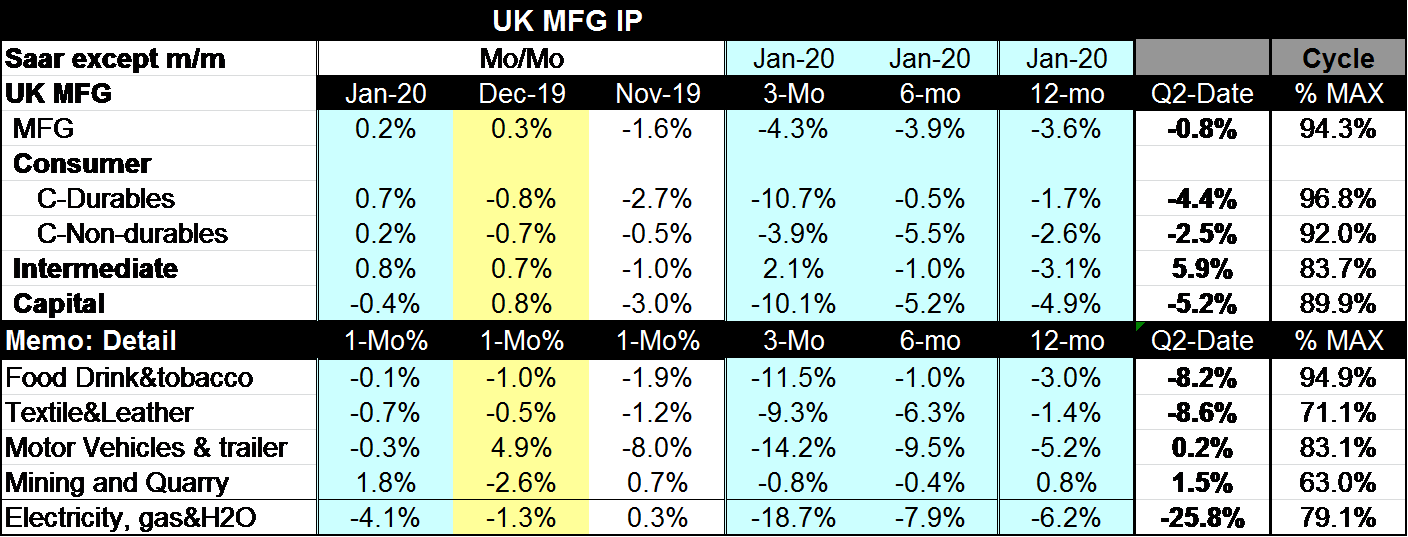 Global| Mar 11 2020
Global| Mar 11 2020UK IP Makes Another Small Monthly Gain in January As BOE Cuts Rate and Government Adopts Stimulus
Summary
Despite having two monthly gains in a row the UK sequential growth time series show that 12-month, 6-month and 3-month growth rates all are in a slowing mode (see chart for this). The simple sequential growth rates comparing the [...]
 Despite having two monthly gains in a row the UK sequential growth time series show that 12-month, 6-month and 3-month growth rates all are in a slowing mode (see chart for this). The simple sequential growth rates comparing the current 3-month to 6-month to 12-month growth rates also show a deceleration in gear but one that is of a moderate nature. In fact the only sector that shows ongoing deceleration in these current sequential growth rates is the capital goods sector. Intermediate goods actually signal some sort of mild pickup if that can be sustained.
Despite having two monthly gains in a row the UK sequential growth time series show that 12-month, 6-month and 3-month growth rates all are in a slowing mode (see chart for this). The simple sequential growth rates comparing the current 3-month to 6-month to 12-month growth rates also show a deceleration in gear but one that is of a moderate nature. In fact the only sector that shows ongoing deceleration in these current sequential growth rates is the capital goods sector. Intermediate goods actually signal some sort of mild pickup if that can be sustained.
Quarter to date output is falling in all major sectors although a few narrow industries show some growth on a quarter-to-date basis (vehicles and mining & quarrying).
Separately The UK economy was reported to have stagnated in January as the expansion in the service sector was offset by falling industrial and construction output. Output, data from the Office for National Statistics (ONS) Wednesday showed that growth ground to a halt in the month. Gross domestic product remained flat in January after expanding 0.3 percent in December. On balance despite the gain in manufacturing IP the overall UK economy is dead in the water in January.
Of course the UK lives in the same world as the rest of us and although the UK is separated from the continent of Europe by the Channel the virus has spread there, too. The coronavirus is loose. Ahead of the release of the ONS report today the BOE cut rates by 50 bp to a record low of 25bp and said it is prepared to do more.
The UK had previously pledged 46 Mil.Pounds to develop a vaccine. The Chancellor of the Exchequer presented his Budget to Parliament today. The new chancellor Rishi Sunak offered a new 30bln pound plan to fight the coronavirus. Sunak said the government will meet the cost of statutory sick pay for firms with up to 250 people, and people who are self-employed and fall sick will be eligible for benefits from day one (here).
The BoE's is ready to initiate further action if needed and is open to quantitative easing, Governor Mark Carny said. He also said the bank is coordinating its actions with the Chancellor on the budget, in order to ensure that measures have maximum impact. Carney observed that the economic damage caused by the virus remained unclear, but the economy is likely to shrink in months ahead.
Beyond the UK
In Germany Angela Merkel has withdrawn her support for the policy of no new debt and has said that 70% of Germans are likely to contract the virus. Czech Prime Minister Andrej Babis, responded that such a statement could spread panic. In Australia Reserve Bank of Australia Deputy Governor Guy Debelle said that a mix of fiscal and monetary policy will help the economy to get through a difficult period. He called the coronavirus is a shock to both demand and supply, Debelle spoke at a business summit, on Wednesday.
When French President Emmanuel Macron greeted Spain's king and queen on Wednesday, he replaced the traditional handshake with an Indian-style namaste, pressing his palms together and bowing slightly (here). European public health authorities say people should avoid shaking hands to curb the spread of coronavirus, which can be transmitted through skin-to-skin contact.
Of course, the virus is spreading and I attempt above to show a few examples of how countries are dealing with it and how policies may be changing. Chancellor Merkel goes for the pure unvarnished truth. The Czech PM finds that approach too raw. The French President wants to initiate a new greeting. Some call the namaste, but I think of it as a traditional Thai greeting. Meanwhile, Italy is clamped down opting for isolation and no greeting! There is a lot of confusion about how the Italian model is supposed to work.
The ECB has asked some staff to work from home. Israel has a14-day quarantine for anyone arriving from abroad before they are allowed to enter the country.
Meanwhile, in the US the approach to limiting or banning large crowds in some states is affecting the Democrat’s primary election season. While Japan has been steadfast some wonder about the fate of the Olympics scheduled to be held in Tokyo but much later this year. The formal lighting ceremony of the Olympic torch in Greece had its attendance limited. And on it goes.
It is clear that countries have adopted different mitigation strategies and have differing needs. Italy has the most severe response among western nations. But now Iran is calling for people to stay at home as the disease there seems to be spreading quite rapidly. The lesson is clear; clamp down early. Iran and China both let the situation slide out of disbelief or simple neglect and both wound up with a bigger problem as a result. China being an authoritarian Communist country was able to initiate a very effective local containment policy to mitigate the spread elsewhere. Italy now is running a quasi containment/mitigation effort of some severity. Italy has also earmarked some $28bln in funds to soften the economic impact. The US has yet to announce any sort of stimulus plan.
Mitigation containment and stimulus are not compatible
It should be clear that mitigation or segmented containment efforts are efforts that blunt economic activity. Mitigation is what you do when containment fails. Although some use a strict sector containment effort to try to limit contagion. But generally once the horse has left the barn shutting door no longer works. At that point you are no longer able to contain the horse but are trying to find him and contain whatever damage he might do while loose. It’s the same with disease. Moreover, there is little a country can do to stimulate an economy under those containment of or mitigation strictures. It would be like saying I have pressed the brake pedal so hard I must press the accelerator harder as well. The best economic policy I believe is to support people and businesses that are economically hurt by the mitigation effort and to initiate stimulus after the crisis has passed not in the middle of it- since that would work at cross purposes.

Robert Brusca
AuthorMore in Author Profile »Robert A. Brusca is Chief Economist of Fact and Opinion Economics, a consulting firm he founded in Manhattan. He has been an economist on Wall Street for over 25 years. He has visited central banking and large institutional clients in over 30 countries in his career as an economist. Mr. Brusca was a Divisional Research Chief at the Federal Reserve Bank of NY (Chief of the International Financial markets Division), a Fed Watcher at Irving Trust and Chief Economist at Nikko Securities International. He is widely quoted and appears in various media. Mr. Brusca holds an MA and Ph.D. in economics from Michigan State University and a BA in Economics from the University of Michigan. His research pursues his strong interests in non aligned policy economics as well as international economics. FAO Economics’ research targets investors to assist them in making better investment decisions in stocks, bonds and in a variety of international assets. The company does not manage money and has no conflicts in giving economic advice.
More Economy in Brief
 Global| Feb 05 2026
Global| Feb 05 2026Charts of the Week: Balanced Policy, Resilient Data and AI Narratives
by:Andrew Cates






